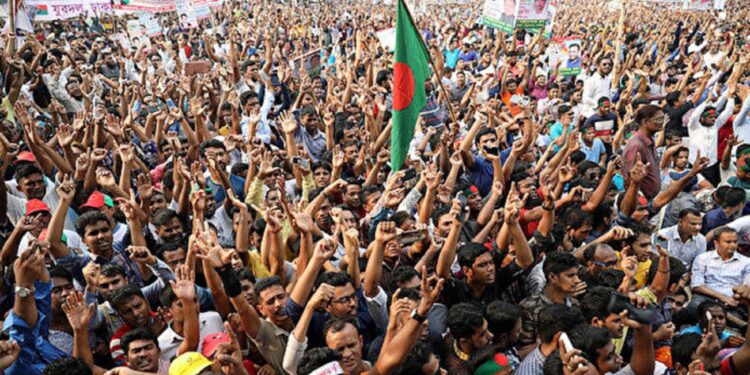The European Union recently notified the country’s election commission that it would not send observers for the forthcoming poll

A file photo of election campaigning in Bangladesh. (Photo: yenisafak.com)
The team’s arrival in the Bangladeshi capital, at least four days after Sheikh Hasina’s return to her country, is expected to raise the hackles among top Awami League government functionaries and especially in the backdrop of the European Union’s formal decision to not send any election observers to Bangladesh. Sheikh Hasina will reach Washington DC on September 23 before arriving in Britain a week later. She is scheduled to return to Dhaka on October 4.
This EU’s conclusive decision is based on an earlier official team’s visit to Bangladesh in July when it undertook a detailed and careful study on the prevailing conditions across the country that could warrant holding of truly free, fair and widely participatory election. This report, along with the EU’s decision to not send election observers whenever the elections to parliament are held, was submitted to the Bangladesh Election Commission recently. Today, Bangladesh Election Commission secretary Mohammad Jahangir Alam confirmed publicly that the EU will not send election observers to Bangladesh.
The American team – three members each from the International Republican Institute (IRI) and the National Democratic Institute (NDI) – is expected to reach Dhaka on October 8, following which the six visitors will meet a wide cross-section of people from civil society organisation, government officials, political parties and others before taking any decision if the ground level situation is conducive for holding elections.
A “non-profit, non-partisan, non-governmental organisation”, the NDI “works in partnership around the world to strengthen and safeguard democratic institutions, processes, norms and values to secure a better quality of life for all”. The organisation says it “envisions a world where democracy and freedom prevail, with dignity for all”.
The NDI receives support from the National Endowment for Democracy, the United States Agency for International Development (USAID) and the US State Department. “Assistance” is also provided by the Consortium for Elections and Political Process Strengthening (CEPPS).
Likewise, the IRI “promotes democracy worldwide” and claims that its “experts” are involved in “responsive politics, political processes, polling, technology, and party building, all with the goal of promoting and establishing free, fair, and accountable democratic leadership around the globe”. The IRI is funded and supported by the US federal government.
While global and regional powers are “invested”, each according to their own objectives and interests, in Bangladesh’s politics and forthcoming elections, if they are held at all, the electorate remains uncertain and unclear about the prospects of polling that will pave the way for the founding of the 12th Jatiya Sangsad.
Commenting on the EU’s decision, a reputed civil society organisation spokesperson said, “This is not surprising considering the prevailing ground realities. Not only is there no level playing field that could otherwise encourage all parties to compete on an equal footing, there are no signs that the situation will improve in the days to come”.
Insisting anonymity, he said that the “Bangladesh Election Commission is determined to hold the elections under the party in power. This raises fears that the electoral outcome is predetermined and aims to return the Awami League to power. This will happen because of the weaponisation of Bangladesh’s constitution that was earlier effected through the 15th amendment after defying the Supreme Court’s 2011 short order. The amendment violated the requirement of holding any referendum and against the will of a majority of Bangladeshis”.
Dhaka-based political analysts, who also refused to be identified, view the US’ visa restriction policy of May 3 (made public on May 24) as an “important tool” to push the ruling regime in Bangladesh to conduct free, fair, participatory and inclusive elections. At least two such political analysts Northeast News spoke with said that “should the US follow the footsteps of the EU, it could significantly impact the way the ruling Awami League seeks to hold an election that is skewed in its favour”.
According to the State Department, the “new visa policy” aims to “support Bangladesh’s goal of holding free, fair, and peaceful national elections. Under this policy, the United States will be able to restrict the issuance of visas for any Bangladeshi individual believed to be responsible for, or complicit in, undermining the democratic election process in Bangladesh. This includes current and former Bangladeshi officials, members of pro-government and opposition political parties, and members of law enforcement, the judiciary, and security services”.
